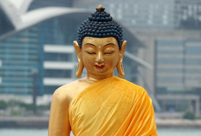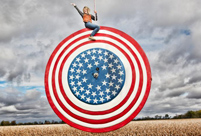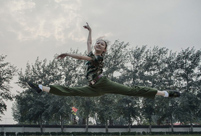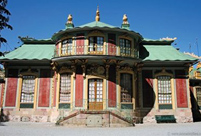 Vintage cars show kicks off in London
Vintage cars show kicks off in London
 Gorgeous scenery in NE China
Gorgeous scenery in NE China
 Picturesque Barkol grassland in Xinjiang
Picturesque Barkol grassland in Xinjiang
 Small Wild Goose Pagoda - A World Cultural Heritage Site along the Silk Road
Small Wild Goose Pagoda - A World Cultural Heritage Site along the Silk Road
 Maritime Silk Road Luxuries of the Han Dynasty
Maritime Silk Road Luxuries of the Han Dynasty
 Ciao! Chinese beauties!
Ciao! Chinese beauties!
 An eye feast: BFA freshmen registration
An eye feast: BFA freshmen registration
 Top 10 most lavish weddings
Top 10 most lavish weddings
 Most amazing chi-pao beauties
Most amazing chi-pao beauties
 Chinese lingerie brand arrives in Las Vegas
Chinese lingerie brand arrives in Las Vegas
The first company globally to receive the right to export horse feed to China was the Irish company Connolly's Red Mills, but group exports director Michael Connolly says the process has been slow and complicated.
The company began seeking Chinese government approval in 2005, and after years of hard work finally managed to export its products there in 2012.
Despite the long-awaited launch, Connolly says, the amount of horse food his team has sold to China has been a little disappointing.
As Connolly's targets the premium horse feed market, its customer base is already limited, and while it has managed to supply most of the premier stables in China, those customers only feed an average of 30 percent of their horses premium feed.
"While we are somewhat disappointed at this stage, we remain optimistic about the future," Connolly says.
The premium food products from Connolly's are on average between 30 and 40 percent more expensive than traditional horse feed of rice bran and oats, he says.
Two big regulatory challenges remain to limit the growth of China's equine sports. The first is the illegal status of betting on horseracing, which means the industry cannot fund itself, because revenue from sponsorship and ticket sales are insufficient to make events financially viable.
A prestigious event like Royal Ascot would be financially viable without betting, but most other horseracing events would not, says Barnett of Ascot Racecourse.
"For Royal Ascot, which is the most important horseracing meeting of the year, the majority of income would be generated through gate money and corporate entertainment, and on top of that sponsorship, TV viewing revenues and then betting."
In comparison, most other horseracing would be supported by income generated through betting and selling pictures to betting providers.
"Some days we would not make a profit without a betting element," Barnett says.
China has not been certified as disease free by the World Organization for Animal Health, which means that overseas horses that enter China are not allowed out again because of the concern that they might spread diseases contracted in China. The Chinese horses are also not allowed to leave the country.
Roly Owers, chief executive of World Horse Welfare, says China's lack of disease-free status for horses means it is difficult for it to host world-class horse competitions, because international owners are unwilling to send their horses there.
This also means China cannot have its horses compete in major international competitions alongside the world's best horses, Owers says.
To be considered for disease-free status, China needs to conduct regular and standard tests for horse health and apply for inspection, he says.
The country's veterinary infrastructure, training infrastructure and other equine industry support functions are slowly catching up with those in more developed international markets.
Yao Congbin, chief technical officer for Connolly's Red Mills, says China's horse veterinary infrastructure is now improving as the country's horse veterinary equipment and medicines are increasingly advanced.
However, its horse veterinary standards are still lacking compared with those elsewhere because traditionally veterinary schools and degrees have not focused on horses, Yao says.
It is only in recent years that horses have attracted more attention in veterinary courses, but there is still a shortage of skilled and experienced teachers. Consequently, China has a dearth of good equine vets.
Yao says he is optimistic about the future of China's equestrian and horseracing industries because horses are an important element of Chinese culture, and equestrian is seen as an emerging fashionable sport.
"In places like Inner Mongolia or Xinjiang Uygur autonomous regions, people learn to ride horses when they are young, so they have a special affinity for them. With the improvement of financial situations, these people would like to go to horse events and ride for leisure, even participating in horse racing.
"At the same time, many young people in big cities are increasingly adopting horse riding as a hobby, which is another important part of the market."
 |
 Appreciating red leaves in early autumn
Appreciating red leaves in early autumn Apple introduces larger iPhones, new watch
Apple introduces larger iPhones, new watch Chinese Buddhist Canon blesses Hong Kong
Chinese Buddhist Canon blesses Hong Kong Beautiful postgraduate teaches in remote area
Beautiful postgraduate teaches in remote area Amazing Guinness World Records
Amazing Guinness World Records Freshmen of Beijing Dance Academy take military training
Freshmen of Beijing Dance Academy take military training Chinoiserie architectures overseas
Chinoiserie architectures overseas Top 10 world's highest-paid models 2014
Top 10 world's highest-paid models 2014 Following the step of Zheng He
Following the step of Zheng He Childhood on grassland
Childhood on grassland Traditional Zhou dynasty style proposal
Traditional Zhou dynasty style proposal Tibetan students embrace new semester
Tibetan students embrace new semester Peace Mission 2014 joint military drill
Peace Mission 2014 joint military drill Sand painting world
Sand painting world Mind-boggling building looks like 'house of cards'
Mind-boggling building looks like 'house of cards'Day|Week|Month